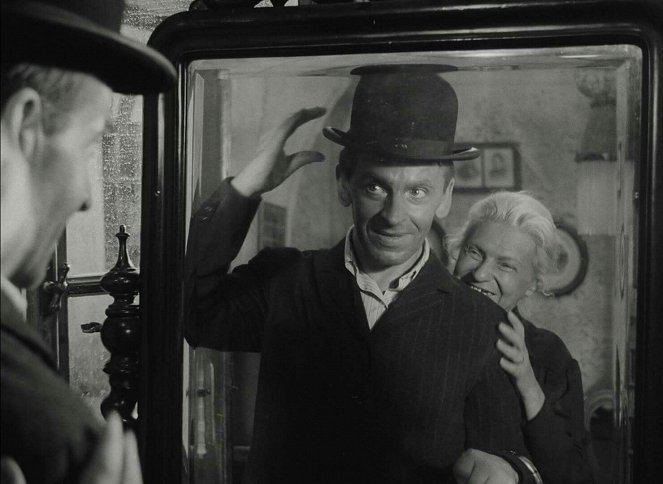Cinematography:
Vladimír NovotnýComposer:
Zdeněk LiškaCast:
Ida Kamińska, Jozef Kroner, František Zvarík, Hana Slivková, Martin Hollý st., Elena Zvaríková-Pappová, Martin Gregor, Adam Matejka, Mikuláš Ladižinský (more)Plots(1)
‘Tóno’ Brtko, a poor carpenter, is appointed by his despised Nazi brother-in-law to be 'Aryan controller' of an old Jewish widow’s sewing shop in a Nazi-occupied Slovakia in 1942. The widow, Rozalia (Yiddish theatre legend Ida Kamińska, nominated here for a Best Actress Oscar® for her performance) is near deaf, isolated and partially sighted, barely even aware of the war or able to comprehend the danger in which she lives. Believing Tóno is simply her new assistant, the two develop a friendship that sees him maintaining that fiction as he attempts to protect her from the encroaching Nazi horror. The Shop on the High Street is a complex tale of common lives disturbed and destroyed by war. Wonderfully written and performed, and with an extraordinary Zdenek Liška score, the film becomes a devastating examination of how minor compromises can finally lead to complicity in the horrors of tyranny. Winner of the Oscar® for Best Foreign Language Feature in 1965, Ján Kadár and Elmar Klos’ The Shop on the High Street (aka The Shop on Main Street) is one of the cornerstones of World Cinema, and perhaps the most internationally renowned film in all Czechoslovak cinema. (Second Run)
(more)Reviews (10)
A great example that Czech, Czechoslovak and Slovak cinematography definitely have something to say and draw from. A perspective on war through the eyes of ordinary people, a perspective on war through the development of one character, and a development that is brilliantly destructive. What the main pair of actors showcase is as incredible as the masterful experimentation of the directing duo. One of the peaks of Czechoslovak cinematography. Actually, of Czech and Slovak independent cinematography as well.
()
If there is a reason for Ján Kadár and Elmar Klos to roast in hell for their film endeavors from the 1950s (and there are a few reasons), then this film more than redeems their transgressions. An excellent, chilling drama from the wartime period that shows how dictatorship and dark times can distort human characters. By the way, when we compare Hřebejk's acclaimed film Divided We Fall with The Shop on Main Street, we understand the difference between a very good film and an excellent one, and the difference between playing it safe and filmmaking bravery. Overall impression: 100%. One of the best films ever produced by the Czechoslovak film school.
()
It's great to work with so many levels and ambivalence of "I'm a good person, after all, I even arise basically against my will, moreover when something comes out of it, but quietly, no one needs to know, especially when I'm calm", and the portrayal of all the characters who walk in front of, in or behind the shop. It's playful in form (hiding from the viewer/camera is exactly what one would expect Herz to have come up with) and it works in multiple ways. It can be unabashedly emotional, everyone acts with gusto, and it's the actions of the characters that are the defining factor, not the declamatory speeches that many other filmmakers would be tempted to make. It is not a probe into the soul of the Slovak nation through addressing the historical skeletons in the closet, but a probe into the soul of an ordinary man under the pressure of the times. Period. That's what makes it timeless. But the whole thing is marred by the ending, where of all the possible outcomes, the one used is by far (but far) the least interesting, and consequently the least compelling. If "it" had at least been done knowingly… Considering the way the central dilemma is handled all along, this is an undignified, cheap "how to get out of it" from Grossman.
()
Of the three Czech/Czechoslovak winners of the prestigious Oscar so far, I think The Shop on Main Street is the film that deserves the golden statue the most. The initially slow story with a few humorous moments turns into a psychological drama with an inevitable ending. The film realistically depicts the atmosphere during the Second World War in one Slovak village. The natural and convincing acting of Jozef Kroner and Ida Kaminska adds to the film's quality. Of course, the most impressive sequence is the last scenes with the deportation of the Jews and the sad ending, which suddenly turns into a conclusion full of optimism, hope and redemption (I don't want to spoil it). In short, a very nice, authentic and well acted film that made me laugh, touched and amazed me - and that says it all.
()
A film so brilliant and so masterfully orchestrated and built up in the second half that it brings me to tears. One of the distinctive cornerstones of the mosaic called "The Golden Era of Czechoslovak cinema of the 1960s", and clear proof (one of many) that it was at that time when the greatest works of cinema in this country were made. The performances of Kroner and Kaminska are superb, the film was a well-deserved worldwide success at the time of its release (as evidenced by the Oscar and the unique Oscar nomination for Kaminska, which was a year too late in the history of this award); it's a pity that it’s almost unknown to today's young generation.
()


Ads